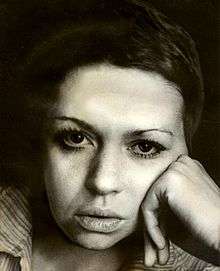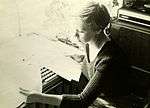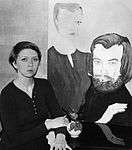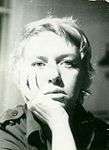Nadezhda Kozhushanaya
Nadezhda Pavlovna Kozhushanaya (Russian: Надежда Павловна Кожушаная; 15 March 1952 in Sverdlovsk – 15 January 1997 in Moscow) was a Soviet, Russian screenwriter and writer. Nadezhda said: "I live and write with love to my crazy time”. She was a philologist and a musician by education, a playwright by vocation. Although she died at the age of 44, she was referred to as “The most gifted screenwriter of the perestroika epoch”.[1]
Nadezhda Kozhushanaya | |
|---|---|
 | |
| Born | Nadezhda Pavlovna Yamshanova 15 March 1952 Sverdlovsk, USSR |
| Died | 15 January 1997 Moscow, Russia |
| Occupation | Screenwriter, writer |
| Citizenship | Russia |
Biography and creative work
Childhood
Nadezhda Kozhushanaya (Yamshanova), was born in Sverdlovsk (Yekaterinburg). Her father was Pavel Ivanovich Yamshanov (the Chief Engineer of a laboratory of the Uralmash plant), who had a rich library of art books and fiction. Her mother was Glafira Mihailovna Yamshanova (Smirnova) (a teacher at a local Metallurgical Technical College). Her parents divorced when Nadezhda was eight. From an early age Nadezhda wrote her own stories and fairy tales. Her story "Pustiak" was based on her first dramatic experience of reading aloud for the class .
University
After school 1968 Nadezhda went to A.M. Gorky Ural State University to study philology. She actively took part as an actress and an accompanist in student theatres of the University and Ural State Academy of Architecture and Arts. She composed music and easily played in the piano, guitar and accordion that gave a nudge to the decision to study in the Urals Mussorgsky State Conservatoire, but her mother made a requirement that Nadezhda should graduate the University first. In preparation to her thesis, Nadezhda worked in the museum of Muranovo, where she also gave guided tours about Fyodor Tyutchev. After graduation, according to the common Soviet practice, she was posted as a teacher of Russian to a remote village of Kunara, Sverdlovsk Oblast. In 1975 Nadezhda married Boris Kozhushany and moved to Moscow, where her husband studied at the Moscow Architectural Institute.[2]
Moscow
In Moscow, first she had a clerical job (later she wrote comic stories about it). Plays and other works of this period almost did not survive, but it was the time when she created her own style. Nadezhda said: «Everything that I wrote is needed to be read aloud». On 1 December 1980 her daughter Ekaterina was born.
In 1982–1984 Nadezda studied at the High Courses for Scriptwriters and Film Directors in Moscow as a Screenwriter. After her admission interview, Valentin Chernykh, one of the leaders of the courses, formulated his reluctance to take Nadezhda as: “She is a person with the character like Gennady Shpalikov, Vladimir Vysotsky, Oleg Dahl. Also she is a woman, so it will be even harder for her ".[2] In the end she was accepted into the workshop of Semyon Lungin.[3] In addition to Semyon Lungin, she studied under Valeri Frid, Merab Mamardashvili, Alexander Mitta, Paola Volkova.[2] During this time she wrote three full-length scripts: «Zabor», «Samiy perviy schastliviy den» (graduation work) and «Poslednyaya igra v kukly". The last script was set in 2010.
Nadezhda Kozhushanaya died in 1996 from pneumonia. After her death she got an honorary title. Overall, she wrote scripts for eight short films, five animation films, four full-length films and a number of scripts which did not turn into films.[2]
Scenography
Full-length films:
- 1987 Mirror for a Hero directed by Vladimir Khotinenko, (Nomination for the Nika Award)
- 1989 Muzh i doch' Tamary Aleksandrovny directed by Olga Narutskaya, (Nomination at the Venice Film Festival)
- 1991 Noga (The Leg) directed by Nikita Tyagunov, (FIPRESSI award at Rotterdam International Film Festival)[4]
- 1992 Prorva directed by Ivan Dykhovichny, (Nomination at the Venice Film Festival)
- 2010 Poslednyaya igra v kukly directed by Georgiy Negashev
Short films and animation:
- 1983 — «Progulki po gorodu», short feature directed by Aleksandr Zeldovich
- 1984 – "Most", short feature.
- 1985 – Nam ne dano predugadat…, short feature directed by Olga Narutskaya.
- 1985 – "Buzkashi", short feature, directed by Pulat Achmatov
- 1986 – "Toro!", short feature directed by Talgat Temenov
- 1990 – Delo proshloe, animation film directed by Oksana Cherkasova
- 1991 – "Terrorist", short feature directed Mihail Rozenshteyn
- 1993 – Plemyannik kukushki (Cuckoo's nephew), animation film directed by Oksana Cherkasova Awards at KROK, Drezden, Parn, Oberhauzen and Hiroshima Animation film festivals.
- 1994 – "Oy, Bog ti moy!", directed Tatyana Skabard
- 1994 – "Neznosty I lasky vam, bolniye", documentary about the centre of Alcoholics Anonymous, VGTRK, directed by Tatyana Lebedeva
- 1995 – Nyurkina banya (Nyurka's bath), animation film directed by Oksana Cherkasova Awards at Zagreb, Leipzig and Espinho Animation film festivals, Nomination for the Nika Award.
- 1996 – Babushka (Grandma), animation film directed by Andrey Zolotukhin Awards at KROK and Fantoche.
- 1996 – The Pink Doll, directed by Valentin Olshvang, Awards at KROK, Leipzig, Zagreb and Hiroshima Animation film festivals.
- 1996 – "Nezivoy zver", short feature directed by Marina Lubakova
Actor works
- 1988 – Muzh I doch' Tamary Aleksandrovny – a cleaner
- 1992 – Noga – a nurse
Gallery
 As Nadezhda Yahmanova,1968
As Nadezhda Yahmanova,1968 Moscow, at the courses
Moscow, at the courses Her portrait of the family
Her portrait of the family Moscow, the end of the 1980s
Moscow, the end of the 1980s Her typewriter in the Moscow Film Museum
Her typewriter in the Moscow Film Museum
References
- 60 anniversary of the birth of Nadezhda Kozhushanaya, Russia-K, 15 March 2012
- Documentary "Perpendicular cinema", dir. by Vasilyeva, VGTRK, 1997 г. Youtube
- Лия Гинцель, "Кино – работа ручная, считает кинодраматург Надежда Кожушаная" // газета г. Екатеринбург, 2 June 1992
- Delazari, Ivan (2014). "In Phantom Pain: The Russian 1991 film adaptation of William Folkner's "The Leg"". In Peter Lurie, Ann J. Abadie (ed.). Faulkner and Film.